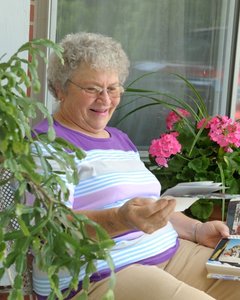Bernice Baker reflects back with fondness on the man she loved for 33 years. “David was wonderful,” she said. “He was full of life and could fix anything. He was conscientious, and he had a knack for operating large machinery with amazing precision. He loved his work.”
For 44 years, David Baker worked road construction and had a reputation for being able to accurately “eyeball” the road grade at great distances, while operating paving equipment, Baker explained.
Together, the Bakers spent their winters in Yuma, Arizona, where they built a home and with their friends explored the desert on dune buggies. In 2006, Baker spotted in her husband the first symptoms of Parkinson’s disease. “I noticed his arm was stiff by his side when he walked, instead of swinging with his gait. When I mentioned it, he brushed off my concern,” she said. Later, he developed slight tremors in his arms, and he lost some motor skills.
While medication helped to stave off David’s symptoms for about a dozen years, he ultimately developed Parkinson’s disease dementia and suffered from many common symptoms. Baker explained that he became argumentative and was often awake most of the night. Frequent hallucinations lead him to believe there were people working in their basement and it was those people who kept him up at night
The number of people living with dementia is rapidly growing and many people are faced with caring for loved ones at home with little support. While Alzheimer’s disease is the most common cause of dementia, it is estimated that 50 to 80 percent of people with Parkinson’s disease eventually experience Parkinson’s disease dementia in about 10 years.
To generate greater awareness and answer questions about all types of dementia, Sarah Bush Lincoln Neurologist Fatima Alao, MD, and licensed clinical social worker, Diane Snow, will be featured on WEIU-TV’s “Being Well” at 7 pm Tuesday, September 13. This hour-long live broadcast will give people the opportunity to call in or email questions about dementia, and have them answered on the air. Clinical social worker Diane Snow will talk about coping skills and resources for caregivers.
Parkinson’s disease dementia is a decline in thinking and reasoning that develops in someone diagnosed with Parkinson's disease at least a year earlier. Common symptoms include: changes in memory, concentration and judgment, trouble interpreting visual information, muffled speech, visual hallucinations, delusions, especially paranoid ideas, depression irritability and anxiety, sleep disturbances, including excessive daytime drowsiness and rapid eye movement (REM) sleep disorder.
Baker’s husband was cognizant enough to know that he wasn’t well and he felt frustrated that he could no longer perform routine tasks. She committed to caring for David at home for as long she could, even though she missed attending church and going on outings with their friends. She knew she could no longer be his sole care provider when she became exhausted from the intensity of the work. “If he didn’t sleep, I didn’t sleep,” she said, noting that one night he took the car out after she went to sleep and ended up at the police station. She relied heavily on her faith in God for the power and strength to make it through David’s health issues.
“I was relieved when I learned Gowin Parc (now Life’s Journey) could care for him,” she said. “The caregivers were really good with him, and he seemed content there. David passed away on April 12, 2016, a year after he moved in.
“I thought I had a lifetime to be with David. You just don’t realize what dreaded disease is hidden in your body that eventually advances to full control and has its way with you to the final breath,” Baker said.
To submit a question to be answered on the “Being Well” broadcast, please email [email protected] in advance of the broadcast or call into the show at 1-822-727-9348.

